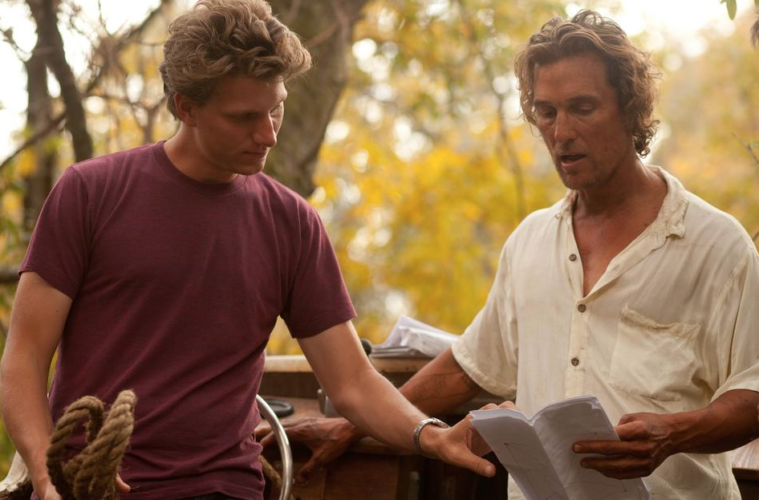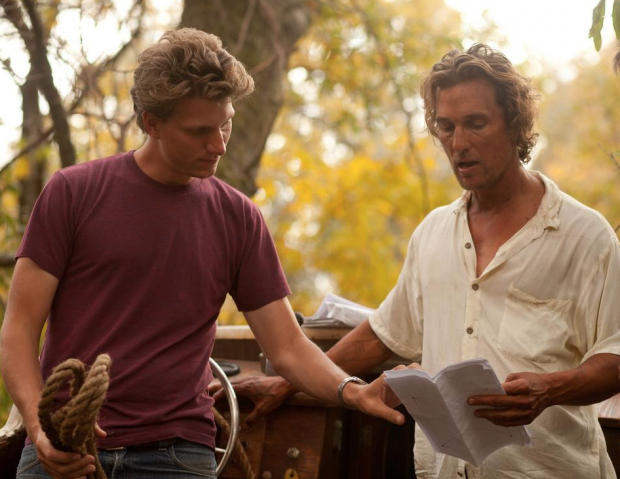
One of the stand-out independent films of the year thus far is the low-key Mud from Take Shelter director Jeff Nichols. Starring Matthew McConaughey, Reese Witherspoon, and two up-and-comers in Tye Sheridan and Jacob Lofland, this coming-of-age tale hits all of the right places and rarely rings hollow. Sitting down with McConaughey and Nichols at SXSW, they would take any question and warp them into a great discussion, playing off one another like best friends. Together, we talked about the crazy rebreather seen in the film, how McConaughey slept on the actual island, what it is about Nichols’ frequent use of shelters, and how they got that boat into that tree. Check out the conversation below.
The Film Stage: This is easily one of my favorite films of the festival. It’s a great kind of throwback, an almost 1970s character piece. Talk a little bit about how this came together and getting Mr. McConaughey involved and, how did this magic come together.
Jeff Nichols: Thank you very much. I started thinking about this back in college and I had the idea of a man hiding out on an island in the middle of the Mississippi River. I had this concept and immediately I was thinking of Matthew for this part and this was back when I was in college. I just kind of kept it and started to add layers to it and everything else and in 2006 I sat down and started writing and I wrote the first thirty pages and I got through the first big dialogue scene on the beach with the boys and then I stopped and said “I’m not ready to write this yet, I’m just not prepared for whatever reason.” I came back the same summer I was writing Take Shelter I was writing Mud and I finished it. I just kind of always had Matthew in mind for this part and I was fortunate enough that my career got to a point to where I could actually give it to him. We were at the same agency and we just connected.
What were your thoughts when you first read the script?
Matthew McConaughey: That it was very specific. It had a very specific voice; the character had language that I had never really heard before but I loved the language and it was highly mysterious to me. I loved the superstition, I loved that it was a love story and I loved that it was about this longing and the pursuit for unconditional, almost innocent love, yet very fierce love for this woman. And, as a character, it was fun for me to go “you know what, this is not about shoulder up. This is not about logic.” This guy, who has been living off the grid and is not really civilized, has been able to be that Labrador you kick off the porch a thousand times and will keep coming back and say “pet me one more time.” And so, for me, it was just really harking me back to junior high and that first time of asking a girl “will you go with me?” and the sweat on your brow that you get wondering if she’s going to say “yes” or “no.” And then the first time I was heart broken and those times where you kind of, what Elis is doing, you learn worse, even though its reality, reality kind of punches you in the face. And this story about this young man who’s on that threshold of his ideas and romanticized view, if you wanna call it romantic, of love is banging up against the ceiling of reality and consequences and real life is showing in the consequences and the reality of that.
So this is this guy Mud, who’s this poet in my mind and sort of aristocrat at heart who’s this conduit, who’s a great guy for this young man to run into for the summer. What a great guy to run into and have a summer with. I’m a stickler for stories like this, for logic of the narrative and he’s a very linear thinking when it comes to script like that so, a well-written script is one you can’t really holes in. A lot of times, and some good movies do it but, to get from act two to act three, they’ll give the character convenience where you’ll go, “that character wouldn’t really do that” but they had to do it to get to the next story point. Nothing’s convenient in this story and even the family trying to kill Mud, you understand why they’re doing it because their brother or their son was killed. The divorce, the couple didn’t get back together at the end, that’s not how life works. Most of the time it’s what happens, they divorce, but I love it when the father’s dropping the son off and he’s sending him off not saying “don’t listen to your mother” he’s basically saying “be good to your mom now.” He took the high road, so to speak, and everyone evolves in that way and it was a fun trip back into innocence for me. You said seventies but that time for me was eighties and maybe that’s just because that’s when I was that age, Elis’s age, that it took me back to that. And I like the deliberation of the story.
Nichols: There is a timeless quality to it. It’s great.
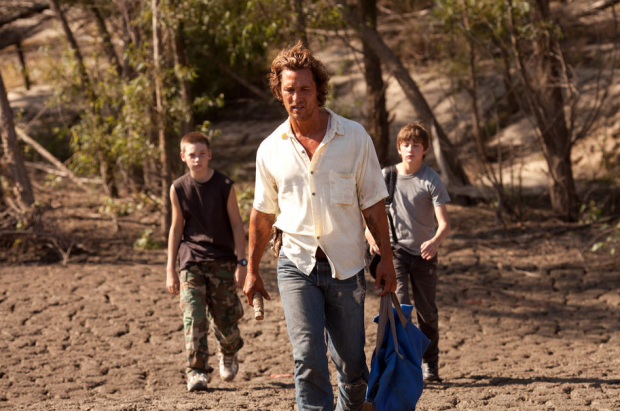
The fact that this relies so heavily on the two kids and they pull it off so well, they really do hold your attention. When you’re casting for this, when you’re writing for that and you finally cast these kids, do you expand on their roles? Was it always this intricate?
Nichols: No, it was written just like this. And you have to give credit to these kids for pulling off these words. Tye had come out of The Tree of Life and he had gone through this kind of amazing experience, which I call Malick bootcamp. He never had a script and so he never had that problem that I think a lot of child where, they just get weird and they get, kind of, reality ground out of them. He was able to be on a big movie pit with Brad Pitt and Jessica Chastain and not suffer any of those consequences. So he’d see all of the machinery and everything but he still knew how to improvise. My problem is, I gave him a script. I gave him a thick script and was like, “I need you to play this part.” But there’s something about him when you meet him. And the same thing happened for Neckbone, this kid Jacob Lofland, you meet him and your like, “you look like him, and you sound like him, and you behave like him, now I just need to know that you can speak these lines.” And you just kind of know it when you see it. I knew Jacob immediately when I saw him. I was like, “that’s Neckbone.” There’s something in their personality; they’re mature but at the same time, totally suit their age. I mean, these kids, they were able to just ingest all of this material and it came back out sounding like them.
McConaughey: But Tye was more of an actor. He knows what he’s doing: he has a bit of a process. Jacob was somebody you found who if exactly who he is on screen, who had the confidence to be himself in front of that camera and say things at just the right times where it was a zinger.
Nichols: See, you’ve seen Jacob, we can actually say we shot Reese first, in the first week, there’s a motel room scene and I remember in the first couple takes, you’re watching Tye and you’re watching everything because Elis is always in the front of the camera and my eyes drift over to Jacob ad he’s got this look on his face, he’s just staring at Reese Witherspoon. So I went up to him and I said, “alright, now don’t look at her like you’re shy. This is a pretty looking woman in a motel room, don’t look at her.” And so then all the takes are him sneaking these looks. And I never had to do that again, that was the only real correction I ever made on Jacob and the correction isn’t what changed him, it’s that, slowly as we started to add days on to our shoot, he just gained the confidence. He looked around like “I got this.” I mean he’s a smart kid and he’s a cocky kid and he was just like “Oh, I’ve got this figured out. I know exactly what I’m doing.” I spent more time on the adult actors than I did on the kids. When you write something like this, though, it’s a leap of faith. You’re just saying “they’re out there.” I just added my name as an executive producer to a film with kids and we were talking about it and I was like “you can’t cast now. You gotta cast right before you shoot and you just gotta know that they’re out there. You’ll know them when you see them.”
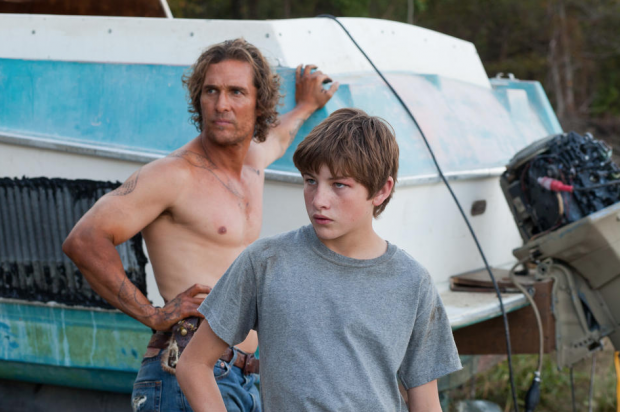
Your film seemed to have a lot of themes whether it’s with revenge, fear and in this case, it was love. As a filmmaker, what are you trying to connect to your audience?
Nichols: The best way to connect to your audience is to just think about yourself. In each one of my films I try to put kind of an emotional punch in the gut somewhere in there and it’s a specific scene, I could tell you the specific scene for each film if you’d like to hear it. But in this one it’s when that girl breaks up with Elis and I just wanted you to watch a tiny little heartbreak on screen. The only way that I know how to connect these things emotionally to people is if they’re extremely personal for me. I don’t know how to hold the world in my mind when I’m writing these things and so, I try to be really specific and I try to find an emotion that is palpable. In Shotgun Stories it was the fear of losing one of my brothers — that is palpable. Anytime in that process through writing, directing, editing, I can tap into that. With Take Shelter it was the fear of losing the stability in my life and my wife and that fear was immediate. And in this, it was that very fierce need that I had, I was fifteen at the time, to have this girl love me and to have my parents stay together, which, they did. I never had any problems with that but you imagine that and that was enough. So I just try and find a personal emotion that is so intense that, at any part of this very long process, I can just tap into it.
When you guys were the age of the boys do you have memories of kind of running out looking for stuff to do?
McConaughey: I had my mini summer but the one that reminded me the most of this was, I now know that it was mom and dad’s second divorce, at the time I thought mom was on vacation, but I was living with my dad and we were living out in the trailer park and I would go exploring. And, miles from the house I had found this really huge oak tree, the biggest oak tree that I had seen. And about fifty yards further I came across a fence and it was a lumbar yard. And so I got some wire cutters and this was all kind of a little bit like, I found the wire cutters, snuck them out, not that anybody was looking for the wire cutters but these are things you’re thinking about, especially when you’re up to no good. I snipped the fence and we went through and we started stealing the lumber and then found the nail gun and I got those and plywood and built a thirteen story tree house in that oak tree. And I did it all summer long and it was only me, I was the only one who knew about it. I would take my lunch out there, climb up to the thirteenth floor and then pulley up the lunch [in a bucket] and eat it by myself. And then at the very end of the summer we were gonna move and I asked my dad to come on a walk with me, I wanted to show him and I showed him and it was thirteen stories. And I think he knows I got the wood from over there but it was done, I got away with it.
In a lot of your movies there’s this theme of hideaways and having shelters, you’ve got like a van down by the river and a tent in Shotgun Stories and obviously a storm shelter in Take Shelter and a boat in a tree on like a private island in Mud and it seems like a great way to create characters by putting them in these private places and I was wondering if that’s part of your writing?
Nichols: I’ve never thought of it that way and I’m just being completely honest with you. I mean, obviously, the shelter, but each one is so specific. That van in Shotgun Stories is really to help show that that character takes retirement early, that concept of early retirement. He just hits pause sometimes and takes retirement and takes shelter and that shelter is the manifestation of everything that’s going on in that guy’s head. And this boat in these trees, it’s the physical image of what we all want out of a summer on an island in the Mississippi River. Like, if Mud was a thing, he’d be that boat in a tree. And in most stories that would be all you would find on an island if you found that. So each one has its specific purpose to the film and I’ve never thought about it thematically as something I try and apply but maybe it’s just something that’s working on me subconsciously. It’s not out there because each one has a very specific…but, oddly enough now that you mention it, it’s purpose is always character. I’ve always said “I write plot second; I write characters first.” And that very much is an example of it. If it’s important to the characters then that’s where the inspiration comes from. I’m never thinking about how to get somebody from point A to point B necessarily. That seems like an afterthought that I need to figure out.
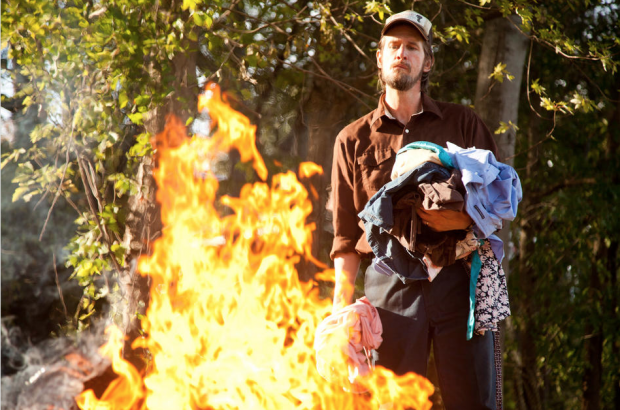
Did you ever have like an island or anywhere you would escape to when you were a kid?
Nichols: Well, I grew up in the suburbs so, I’m a lie if you wanna build me up as this sweetheart and soft kid that grew up on the river in the woods. And there was actually this group of magnolia trees I used to go into that had arms that grew in a canopy to the floor and you could walk into them, literally, and just be hidden. That’s the closest thing to it probably. This river was actually something I had discovered during the writing of this film, when I had the conceit I really didn’t have much experience with the river and it was a part of Arkansas, my home state, that I wasn’t very familiar with. So, as I was going down there to figure out this story, I was figuring out this river too and it’s when you’re struck by it, you’re literally struck by the Mississippi River and your jaw drops a little bit. And it’s teeming with wildlife and you just feel like you’re in another place for sure.
I was curious about the challenges of working on that, for both of you, because, to me, that river is like one of the main characters of the film.
McConaughey: One of the first things you said to me [to Jeff], about how you were focusing directing different from your last films was, the camera’s gotta move like the river; that slow, fluid pace. Challenges? It’s a real asset, as an actor, when you get to go on location and it’s that location specifically. Because there’s not a demarcation between “okay, now we go to work, now we go home.” I’m not going back to the city, back to the apartment. You’re in rural Arkansas and even if you went back to town to your hotel or home, you were still in rural Arkansas and the people walking around were the people in the story. And then, I try to take advantage of it, I camped out on the river some, which was wonderful. One, you get two extra hours of sleep, because you don’t leave set and two, my only neighbor each night were those tugboats taking stuff up from New Orleans to St. Louis on the Mississippi River, or the donkeys that came by that were on these then thousand acres, or the girl who came by whose name was “Ladasha” and I asked her how you spell that because I had never heard the name before and on her driver’s license it was “L-A-Hyphen-A.”
Nichols: I have to give credit to Matthew. I never slept on that island and he came to us late, we started shooting different parts of the film first and he was coming from another film.And you’re on set and you’re working and somebody came up and almost whispered, “Matthew’s gonna camp out. He wants a tent. Do you know anyone that has a tent?” And I just remember thinking, “this is awesome.” Because we hadn’t worked together before. I’d met him and we’d had conversations leading up to it but you never know really what you’re gonna get and I was like, “this is the right guy. This is the guy.” And he did. He went and camped out on the island. I never did that. And when [Matthew was] telling me the stuff about the barges and the spotlights I was like, “I would’ve written that in the script if I had done my work and stayed out there.” He dug in for sure. But it was a massive expenditure in terms of time and treasure to get out to these places. The boat in the tree wasn’t on the island. But it’s not like we found an easy tree. We built a road in order to get down there to it because we knew so much would have to go there. That boat had to be lifted by a crane to be put into the tree so we had to build a road; I don’t know how much money that cost, more than my first film, probably. So, everyday would start with a drive and then you would get into a gator, like a four-wheeled vehicle, and that would take you someplace and then you’d get into a boat and then you’d go someplace and it was just like you were always immersed, you were doing what the boys were doing. So it was very beneficial.
McConaughey: That is beneficial.
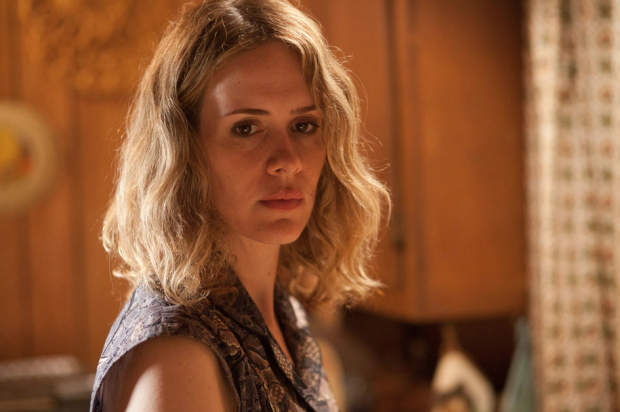
I thought you really effectively captured the feeling of growing up in a small town. What inspired you?
Nichols: Like I said, I grew up in the suburbs but in Little Rock, you drive thirty minutes and you are in the middle of these places. And my grandparents grew up there, my parents grew up in a very small town and I was in a very unique position. I think, had I grown up in a small town like that, I might have some resentment or I might be one of those people that’s just like “ah, I gotta get out of there!” I actually had an outsider’s point of view but with insider’s access. So I would go and stay for weeks at a time with my grandparents and be brought into their community and their friends and everything else so I got to observe people and observe this way of life. And it’s been beneficial for me through all my writing because it’s characters that I feel comfortable with; it’s a location that I feel comfortable with. Which, isn’t to say it’s easy, it’s just something I feel like I understand.
What was your relationship like off-screen with Tye Sheridan? In the film, it kind of seems like you have this mentor relationship with him.
McConaughey: I mean, somewhat. I didn’t try to do anything conscious. We kind of became friends. So I didn’t ever try to go, let me try to give you some advice. There was never anything like that and that’s not who Mud is. Mud would answer a question if Elis was like, “my dad said this” Mud would go “no, that’s not true” because that’s what Mud knows. We hung out a little bit explored some of those camps and stuff like that and when they took him and Jacob and my son fishing at the edge of the river it was neat for the first time becoming a parent myself to have their parents come by and go…and I go…and I was for the first time telling these other parents “your kids will be fine. We’ll watch over them. We got food and things like that.” And then sitting there and going “Yeah you can camp outside, yeah you can stay out late, yeah you can…” So, like I said, Mud was a fun guy in the summer. When I look at the film I go, “boy, if I had a summer that’s the guy I’d wanna run into. Dangerous, fun, mysterious.”
So I was just kind of Mud with them as much as possible but it wasn’t something I thought about or felt like I needed to work on and they didn’t need it either. There was also a certain distance, though. We didn’t need to become chummy best friends because they didn’t need to know…there’s something that I’ve learned as an actor, if you get to know someone really really well off set, that’s fine and good. What it also does is, if you choose to, you’re reminded that they’re acting if they’re someone else when you’re with them on screen. I remember learning that from Chris Cooper. He had a small part in Time to Kill and I remember meeting him on set and he had his hands in his pocket and he’s like “hey, how you doing.” And then we worked in Lone Star and he was like “hey, how you doing.” So, the first time I actually met him is when I’m in a scene with him. And it was great I remember the feeling and going “ah!” And I was so in the moment because I was just meeting him for the first time, because he showed nothing. I’m not saying I did that literally but there’s something about what you don’t say, what you don’t do. I wasn’t always around, but if you came around you were welcome to.
Nichols: I’ve never heard that. We usually hear the same things but I’ve never heard that. That’s really smart. That’s really interesting. Because, I remember, I really like Paul Sparks, the guy who played Carver and I was like, “man, Matthew should know Paul Sparks, they should hang out and be friends. But it’s like, Matthew doesn’t wanna hang out with Paul Sparks because they’re mortal enemies.”
McConaughey: And it was towards the end of filming for me and he had come in and I remember going up and meeting him but I was hesitant to do that but we just shook and kind of looked at each other and didn’t say another word until the end of the night. So I didn’t show my hand and he didn’t show his besides being like “mhm.” And then at the end of the night, after the scene was over, we talked about, “good job on this or that or the other” and he smiled and he was Paul Sparks for the first time and that’s fun to do that and not know what the other person’s gonna do. It goes into that a little, we’re out there playing make-believe, so we get the luxury, it’s not just Halloween night, for two months we get to play make-believe so you wanna protect that.
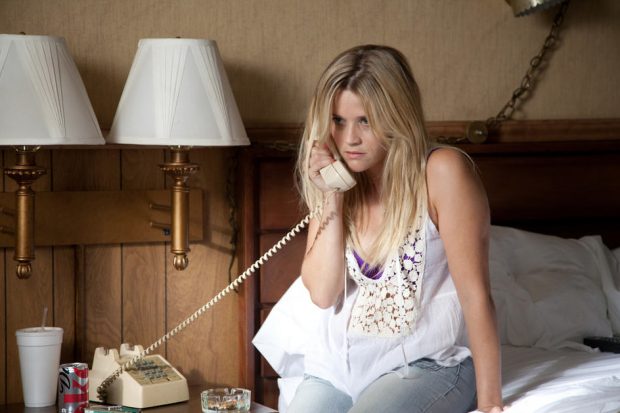
I just wanted to know about the rebreather that Michael Shannon uses in the film. What the hell is that and how did you find out about it?
Nichols: Yeah, one of the first things that sparked my idea was a book called The Last River that I found in the Arkansas Public Library and it was a photo essay of people who make a living off the rivers. And there was this guy who would dive for muscle shells and he had a diving helmet made out of a hot water heater with a garden hose attached to the top and the pictures were right there in the book and I could go into some more detail that I won’t bother you all with but the interesting thing is, when we went down to do the film, our production designer started asking around, and our props guy, started asking around about these things and we found, the guy that’s in the movie that’s kind of Mike Shannon’s helper who’s drinking beer, he’s related to the guy and we used one of their diving helmets as a model to build our own, we ended up building out own. The affectation that we added is the visor. I saw one photograph of one that had a visor but the majority of them are big cans they stick on their head and they can’t see because they couldn’t see anything anyway because it’s the bottom of the Mississippi River. So that’s an affectation. You go down to the bottom of the Mississippi River, you can’t see anything it’s mud. And they would just sit on their butts and just feel around for these muscle shells and stick them in the bucket. I could talk about that for days but yeah it’s what we did for the whole movie. I found these houseboats for an inspiration and I found a second cousin that had one and went down and we shot in one and we shot in several and there were no sets, there were no props even. That’s Mike Shannon in a homemade hot-water heater guide helmet.
Since it took you this amount of time to get the script and do the film, what does it feel like for you now to have it completed?
Nichols: It’s very satisfying. I’m proud of this film and I’m proud of what we’ve done. And I don’t know if it’s any different than the others but this one feels different in terms of my relationship to it, because I’ve carried it for so long. Take Shelter, I conceived of it in 2007, wrote it in 2008, shot it in 2010 and 2011. That film was immediate. That film had to come out and be about that time. And this film, sometimes people use the term nostalgia as a negative term but this is a nostalgic film for me because I’m looking back at myself in a period of time when I was younger and this whole film was supposed to feel kind of timeless. It did for me personally so if that translates, great. But it’s this kind of relief. I’ve been carrying Mud around so long that it’s out there. If the plane crashes tomorrow at least Mud had been made.
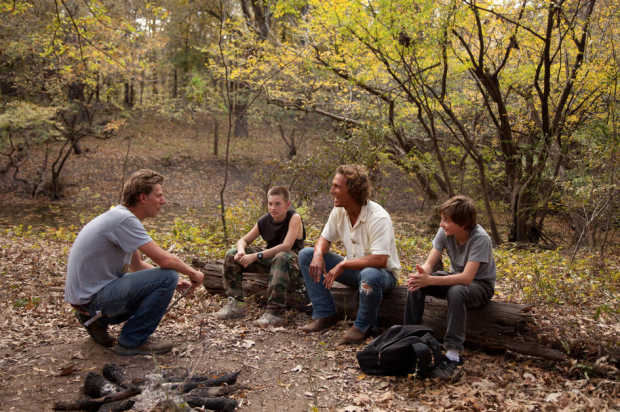
Mud hits theaters on Friday, April 26th.

